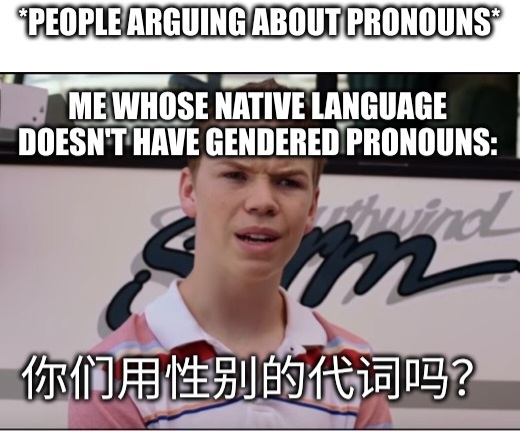this post was submitted on 30 Aug 2023
991 points (95.9% liked)
Memes
50658 readers
543 users here now
Rules:
- Be civil and nice.
- Try not to excessively repost, as a rule of thumb, wait at least 2 months to do it if you have to.
founded 6 years ago
MODERATORS
you are viewing a single comment's thread
view the rest of the comments
view the rest of the comments

I prefer the elimination of gender by using the participle because I think it’s easier to read and say, e.g. instead of Student:In you say Studierende (I guess also using the genderless plural of the participle, similar to the English concept). I’m not sure what the equivalent for Bürger would be though. Geborgene?
Don't think that works for words that don't have a verb as a base, i.e. Krankenpflege works because Pflege is a Verb and can be conjugated to Krankenpflegende but Mechaniker:in doesn't conjugate.
Also Geborgene means nothing even adjacent to being a Bürger. I'd personally would have guessed Bürgende but even that is a major stretch. You would either have to create an entirely new way to conjugate nouns or you have to use synonyms that can be conjugated that way. Both ways will be a huge change to how German is spoken
Why not just use the generic plural form (Bürger) as people always have? It has always been used for mixed groups so why shouldnt it continue to? And sometimes it doesnt even work (eg. for "Bauer". The plurals would be "Bauern" and "Bäuerinnen".
The problem people have with the Generischer Maskulinum is, that it is exactly that, the male plural form.
Grammatical genus is not the same as biological gender. Or do people that are biologically neither male nor female need a third plural form?
That would be another advantage if we had a form that clearly eliminates the gender.
Bürgende?
"Liebe Mitmenschen", meistens ist es nicht nötig, nur diejenigen mit der Staatsbürgerschaft anzusprechen, sondern alle, die in dem Land leben